Musical Favorites
I am a fortunate son.
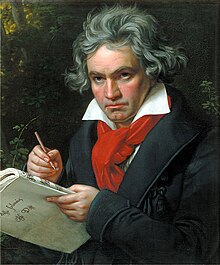
 My grandfather was a professor of music. My aunt was a concert pianist of international renown. My father loved classical music and having little choice other than to retreat upstairs to my room, I learned to listen and appreciate it. Which I think my father appreciated as well. But I think my real appreciation of classical and Baroque music occurred gradually, peaked by my acquisition of two close in center section box seats for The Florida Orchestra (an outstanding symphony orchestra). That's when I truly learned to appreciate such musical greats as Bach, particularly his Brandenburg Concertos, Beethoven's 7th Symphony with it's incredible (and incredibly moving) Adante, Piano Concerto, Vivaldi's Four Seasons, Dvorak's Symphony for the New World (the performance of in New York which he was able to attend and brought him a long standing ovation), pretty much anything by Chopin, and Mozart's Ein Klein Nacht Music.
My grandfather was a professor of music. My aunt was a concert pianist of international renown. My father loved classical music and having little choice other than to retreat upstairs to my room, I learned to listen and appreciate it. Which I think my father appreciated as well. But I think my real appreciation of classical and Baroque music occurred gradually, peaked by my acquisition of two close in center section box seats for The Florida Orchestra (an outstanding symphony orchestra). That's when I truly learned to appreciate such musical greats as Bach, particularly his Brandenburg Concertos, Beethoven's 7th Symphony with it's incredible (and incredibly moving) Adante, Piano Concerto, Vivaldi's Four Seasons, Dvorak's Symphony for the New World (the performance of in New York which he was able to attend and brought him a long standing ovation), pretty much anything by Chopin, and Mozart's Ein Klein Nacht Music.
 I cannot recall when I first heard jazz. I think it was my brother Ed (a huge five years older) who turned me on to it. I can remember that back in those days, there were jazz instrumentals on the charts, such as Al Hirt playing Java on trumpet. I was studying trumpet at the time, and leaned to play it well enough that our band and orchestra instructor took me on a tour to other schools in the area, backed by the orchestra. But I gave up trumpet in college, and never played it again. I can't help wondering if having heard Miles Davis (pictured on the right) early on (he peaked around 1959 with his seminal album Kind of Blue) might have made a difference.
I cannot recall when I first heard jazz. I think it was my brother Ed (a huge five years older) who turned me on to it. I can remember that back in those days, there were jazz instrumentals on the charts, such as Al Hirt playing Java on trumpet. I was studying trumpet at the time, and leaned to play it well enough that our band and orchestra instructor took me on a tour to other schools in the area, backed by the orchestra. But I gave up trumpet in college, and never played it again. I can't help wondering if having heard Miles Davis (pictured on the right) early on (he peaked around 1959 with his seminal album Kind of Blue) might have made a difference.
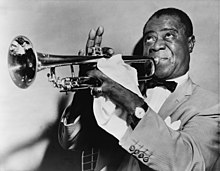 Of course it was inevitable that I'd hear the great Louis Armstrong (the Satchmo, and the first famous person I'd heard of who smoked weed prior to every performance, according to his own memoirs). And his partner in crime, the great Ella Fitzergald was not to be missed.
Of course it was inevitable that I'd hear the great Louis Armstrong (the Satchmo, and the first famous person I'd heard of who smoked weed prior to every performance, according to his own memoirs). And his partner in crime, the great Ella Fitzergald was not to be missed.
Another '50's jazz single I liked was Canadian Moe Koffman playing flute on his hit Swingin' Shepherd Blues.
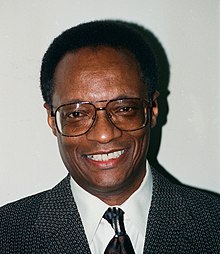 And I don't think I'm alone in considering Ramsey Lewis (left) and his The In Crowd an all time favorite. Who doesn't want to be in the In Crowd?
And I don't think I'm alone in considering Ramsey Lewis (left) and his The In Crowd an all time favorite. Who doesn't want to be in the In Crowd?
I have fond memories of first listening to Vince Guaraldi and his jazz piano solo Cast Your Fate to the Wind. It evoked beauty, and sadness both. Vince would later on write the music for the comic animations of Peanuts.
 The first jazz saxophonist to catch my ear during my years in L.A. was Grover Washington, Jr., (right) with his Winelight album, which I still have in cassette format (and yes, I still have a cassette player, that also plays CDs, so there!).
The first jazz saxophonist to catch my ear during my years in L.A. was Grover Washington, Jr., (right) with his Winelight album, which I still have in cassette format (and yes, I still have a cassette player, that also plays CDs, so there!).
Another favorite jazz performance was Brazilian saxophonist Gato Barbieri (Gato means cat, and he was a cool one) playing Europa. And guess who the composer of that tune was? Carlos Santana.
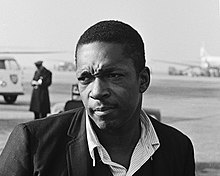 My favorite cut by John Coltrane (left) was Equinox.Man could he make that sax sing.
My favorite cut by John Coltrane (left) was Equinox.Man could he make that sax sing.
My favorite Miles Davis track was his rendition of It Ain't Necessarily So, on his Porgy and Bess album, in 1959.
 Yet another favorite saxophonist is Stan Getz (right). I still have two great albums of his, but my favorite (and possibly yours) is the album he recorded in Rio de Janiero, Getz and Gilberto with vocalist Joao Gilberto, who made the mistake of bringing his wife, Astrud. Her vocals on The Girl from Ipanema made me want to jump on the next plane to Rio. Somehow I never did. Sad. (An actual sad outcome of this album, at least for Joao, was Getz stealing his wife. Seriously, Stan).
Yet another favorite saxophonist is Stan Getz (right). I still have two great albums of his, but my favorite (and possibly yours) is the album he recorded in Rio de Janiero, Getz and Gilberto with vocalist Joao Gilberto, who made the mistake of bringing his wife, Astrud. Her vocals on The Girl from Ipanema made me want to jump on the next plane to Rio. Somehow I never did. Sad. (An actual sad outcome of this album, at least for Joao, was Getz stealing his wife. Seriously, Stan).
 A more recent favorite on trumpet is Rick Braun (Cadillac Slim).
A more recent favorite on trumpet is Rick Braun (Cadillac Slim).
And not to be outdone on sax, Cannonball Adderly's live performance of Mercy, Mercy, Mercy is a classic. I just wish I could reach back in time and strangle the guy in the audience for yelling 'Woo hoo' about a million times. (Pictured here with his cornet-playing brother Nat.
 A less well-known jazz artist is Jean Luc Ponty, out of Paris. He made the international charts on the violin, of all instruments with his original: Renaissance. I first heard that on an FM station in my 20's, while stuck in traffic in Washington D.C., for some reason.
A less well-known jazz artist is Jean Luc Ponty, out of Paris. He made the international charts on the violin, of all instruments with his original: Renaissance. I first heard that on an FM station in my 20's, while stuck in traffic in Washington D.C., for some reason.
 Then, how about Peggy Lee's great hit, Fever. Just her and an upright bass.
Then, how about Peggy Lee's great hit, Fever. Just her and an upright bass.
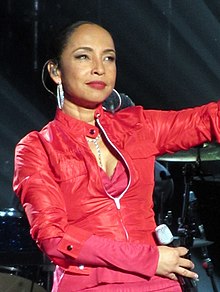 Other female singers I like a lot are Brenda Russell (Piano in the Dark), and Randy Crawford (Rio de Janiero Blue and Cajun Moon). And especially Sade (pronounced 'Shar-day'). Go to Youtube and summon up her performance video of her dissing off Mr. Smooth Operator.
Other female singers I like a lot are Brenda Russell (Piano in the Dark), and Randy Crawford (Rio de Janiero Blue and Cajun Moon). And especially Sade (pronounced 'Shar-day'). Go to Youtube and summon up her performance video of her dissing off Mr. Smooth Operator.
A Southerner to the bone was singer, songwriter and pianist Mose Allison, who combined jazz with blues, and whose classic Parchman Farm (the name of a Mississippi prison, so you can imagine how bad it was there) was covered by John Mayall, among others. Allison's music had an important influence on other artists, such as Jimi Hendrix, J. J. Cale, the Yardbirds, the Rolling Stones, Tom Waits, and Pete Townshend.

 Thanks to my brother Ed I discovered the big bands when I was still in middle school (we called it Junior High in New Jersey, where we lived). He introduced me to the Count Basie Orchestra, Glenn Miller (right) who had more number one hits than the Beatles or Elvis before vanishing in a fighter plane over the English Channel during WW II, and the great Duke Ellington, (left) for the big band sound. For specific favorites, Miller's In the Mood qualifies. Also Ray Anthony's rendition of the great classic Harlem Nocturne. Ellington's band theme song was 'Take the A Train.' Something I did numerous times during my New York years.
Thanks to my brother Ed I discovered the big bands when I was still in middle school (we called it Junior High in New Jersey, where we lived). He introduced me to the Count Basie Orchestra, Glenn Miller (right) who had more number one hits than the Beatles or Elvis before vanishing in a fighter plane over the English Channel during WW II, and the great Duke Ellington, (left) for the big band sound. For specific favorites, Miller's In the Mood qualifies. Also Ray Anthony's rendition of the great classic Harlem Nocturne. Ellington's band theme song was 'Take the A Train.' Something I did numerous times during my New York years.
When I was in high school I discovered Buddy Morrow, another big band from the '40s. and played my '45 of Night Train over and over, until I wore it out.
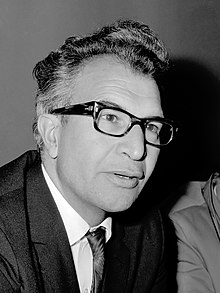 And who doesn't love John Barry's James Bond theme. That twangy guitar was played by Vic Flick (great name!). He was paid nine pounds for his studio work (hey, just a few takes at most, right?). And hey, adjusted to inflation that's probably close to 100 bucks, OK?). John Barry did eventually do the right thing, and cut Flick in on the millions in royalties he'd been getting for a dozen or two Bond films.
And who doesn't love John Barry's James Bond theme. That twangy guitar was played by Vic Flick (great name!). He was paid nine pounds for his studio work (hey, just a few takes at most, right?). And hey, adjusted to inflation that's probably close to 100 bucks, OK?). John Barry did eventually do the right thing, and cut Flick in on the millions in royalties he'd been getting for a dozen or two Bond films.
But small bands were coming, some just four players, such as Ramsey Lewis, and The Dave Brubeck Quartet, whose Take Five from his Time Out album (the tune was composed by his alto saxophonist Paul Desmond).Then came artists who were virtuosos in ensembles of any size, such as Miles Davis, John Coltrane, and Cannonball Adderly, all of whom reached greatness. For anyone who has not listened to these artists, or not recently, now would be an excellent time. For specific faves, Dave Brubeck's monumental hit from the album Time Out was Take Five (albeit composed by his alto saxophonist Paul Desmond) is way up there;
 One of the very first bands to cross over to jazz from Gospel and Memphis (also a trend-setting integrated combo) , if not the first jazz combo (also a quartet) was Booker T. and the M.G.'s (left) with their mega-hit Green Onions. They were also one of the first integrated bands, apart from the classic big bands.
One of the very first bands to cross over to jazz from Gospel and Memphis (also a trend-setting integrated combo) , if not the first jazz combo (also a quartet) was Booker T. and the M.G.'s (left) with their mega-hit Green Onions. They were also one of the first integrated bands, apart from the classic big bands.
With the Sixties, of course, Rock and Roll came of age, graduating from Buddy Holly, the Everly Brothers and Elvis, to the British Invasion, and Rock exploded across the world, coming from as far away as Australia (The Bee Gees and AC/DC), spreading in the '70's even to/from France, with Enigma, as well as ABBA from Sweden.
 But, as loud as Mick Jagger might shout his denials, it was The Beatles who changed the world. Sgt. Pepper's Lonely Hearts Club Band was a truly revolutionary work, and much of the credit for their success was their producer/arranger the great George Martin.
But, as loud as Mick Jagger might shout his denials, it was The Beatles who changed the world. Sgt. Pepper's Lonely Hearts Club Band was a truly revolutionary work, and much of the credit for their success was their producer/arranger the great George Martin.

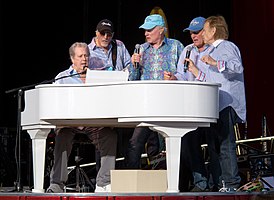 Meanwhile, back in the States California Dreamin' was soon in vogue, led by The Beach Boys first, then some cool surfing instrumentals like The Chantays' Pipeline and Walk Don't Run by The Ventures (From Tacoma, Washington, no less. Tthere was a host of those, back then, such as Dick Dale's Miserlou, then heading south for a shot of Tequila by The Champs (or maybe just East L.A.) then back east to Memphis for, well, Memphis by Lonnie Mack. (Actually, it was Johnny Rivers' song first, he wrote it, and it's a great, but sad song: here's the original).
Meanwhile, back in the States California Dreamin' was soon in vogue, led by The Beach Boys first, then some cool surfing instrumentals like The Chantays' Pipeline and Walk Don't Run by The Ventures (From Tacoma, Washington, no less. Tthere was a host of those, back then, such as Dick Dale's Miserlou, then heading south for a shot of Tequila by The Champs (or maybe just East L.A.) then back east to Memphis for, well, Memphis by Lonnie Mack. (Actually, it was Johnny Rivers' song first, he wrote it, and it's a great, but sad song: here's the original).
Ahead of their time were The Zombies, who were actually skilled musicians. Their hit She's Not There blew me away with that keyboard solo by (most rock musicians were not, until the great guitar players like Jimmy Page (Led Zeppelin) Mike Bloomfield, Elvin Bishop, Brian May, Eric Clapton, Pink Floyd's David Gilmour, Peter Townsend, and Peter Green (more on some of these later).

 Then there was that incredible one-time Monterrey Pop Festival in 1967, led by the Jefferson Airplane, with Grace Slick, and introducing The Jimi Hendrix Experience to the world, The Who to the States, likewise Eric Burden and The Animals, and of course S.F.'s Grateful Dead would leave thousands of fans grateful, if not dead (quite). The band is known for its eclectic style, which fused rock, jazz, country, blues gospel, and psychedelic. elements of rock, folk, country, jazz, bluegrass, blues, gospel, and psychedelic rock;[3][4] for live performances of lengthy instrumental jams;[5][6] and for its devoted fan base, known as "Deadheads." "Their music," writes Lenny Kaye, "touches on ground that most other groups don't even know exists. Also Otis Redding's first major appearance, and almost his last. He tragically died in a plane crash (like so many other music stars) before Sittin' on the Dock of the Bay was even released. Also appearing in her first major appearance, Janis Joplin's Big Brother and the Holding Company. And Ravi Shankar was there with his sitar to lure Westerners to his ashram (the Beatles would later take him up on it). The festival closed with The Mamas and the Papas (band founder John Phillips was co-organizer of the Festival) with their smash breakout hit California Dreamin'. It was The Summer of Love, much, in effect, to counter the war in Vietnam.
Then there was that incredible one-time Monterrey Pop Festival in 1967, led by the Jefferson Airplane, with Grace Slick, and introducing The Jimi Hendrix Experience to the world, The Who to the States, likewise Eric Burden and The Animals, and of course S.F.'s Grateful Dead would leave thousands of fans grateful, if not dead (quite). The band is known for its eclectic style, which fused rock, jazz, country, blues gospel, and psychedelic. elements of rock, folk, country, jazz, bluegrass, blues, gospel, and psychedelic rock;[3][4] for live performances of lengthy instrumental jams;[5][6] and for its devoted fan base, known as "Deadheads." "Their music," writes Lenny Kaye, "touches on ground that most other groups don't even know exists. Also Otis Redding's first major appearance, and almost his last. He tragically died in a plane crash (like so many other music stars) before Sittin' on the Dock of the Bay was even released. Also appearing in her first major appearance, Janis Joplin's Big Brother and the Holding Company. And Ravi Shankar was there with his sitar to lure Westerners to his ashram (the Beatles would later take him up on it). The festival closed with The Mamas and the Papas (band founder John Phillips was co-organizer of the Festival) with their smash breakout hit California Dreamin'. It was The Summer of Love, much, in effect, to counter the war in Vietnam.
 Then things would take a darker turn, perhaps due to Vietnam, with The Doors, predicting The End; then pointed protest songs like Country Joe and the Fish with their Fixin' to Die, and Barry McGuire's Eve of Destruction (are we facing another such eve now?).
Then things would take a darker turn, perhaps due to Vietnam, with The Doors, predicting The End; then pointed protest songs like Country Joe and the Fish with their Fixin' to Die, and Barry McGuire's Eve of Destruction (are we facing another such eve now?).
Another fine rock band emerged out of New York (complete with Brooklyn accent: 'I hoid it through the grapevine') in Creedence Clearwater Revival, led by John Fogarty. Their hit Fortunate Son was also a protest song.
Other great rock bands that deserve mention are The Animals, led by Eric Burden, with their breakout hit House of the Rising Sun. Also
The Police, and even better, Sting when he went solo, Cream, Pink Floyd, Led Zeppelin, and more recently The Verve, again from the UK.
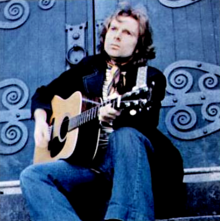 Outstanding solo artists must include Van Morrison, who started out in Belfast with his band Them (Gloria), then went on to a brilliant solo career. His Into the Mystic was mystical in numerous ways, and his 1970 album Moondance is in my top ten greatest. Give it a listen if you haven't.
Outstanding solo artists must include Van Morrison, who started out in Belfast with his band Them (Gloria), then went on to a brilliant solo career. His Into the Mystic was mystical in numerous ways, and his 1970 album Moondance is in my top ten greatest. Give it a listen if you haven't.

 I must also include blues on this list. I first encountered blues when I attended the Newport Folk Festival (where Dylan made his name), and heard this incredible heavy electric sound. I wanted over to see and hear what was what, and it was an all-black band led by a huge man named Howlin' Wolf, and man could he howl. Electric guitars way ahead of their time, and a man named Willy Dixon on base. I later learned bass from him, and joined the only blues band in NYC at the time as bassist. It was kind of sad when I looked him up in L.A. years later, and he was living in a run-down motel.
I must also include blues on this list. I first encountered blues when I attended the Newport Folk Festival (where Dylan made his name), and heard this incredible heavy electric sound. I wanted over to see and hear what was what, and it was an all-black band led by a huge man named Howlin' Wolf, and man could he howl. Electric guitars way ahead of their time, and a man named Willy Dixon on base. I later learned bass from him, and joined the only blues band in NYC at the time as bassist. It was kind of sad when I looked him up in L.A. years later, and he was living in a run-down motel.
Eric Clapton was, of course, the premier blues guitarist of his generation, although Peter Green, who started out with John Mayall and the Bluesbreakers.was way up there (check out an incredible solo tune of his, performed with Mayall's band, called The Supernatural. It definitely sounds supernatural. Greene would move on to co-found Fleetwood Mac, and the Rock and Roll Hall of Fame from there.
Also, Pink Floyd's David Gilmour was an incredible guitarist. Who can forget his long solo on Shine On You Crazy Diamond. It would make you wish you were there, indeed.
Eric Clapton started out with The Yardbirds (which had three of rock's most famous guitarists, Eric Clapton, Jimmy Page and Jeff Beck, all of whom ranked in the top five of Rolling Stone magazine's list of 100 greatest guitarists. Clapton then joined John Mayall, then Cream, then went solo, earning no less than 19 Grammy Awards.
I think I would have to say that the Rock Era came to an end with Don McLean with his classic American Pie.
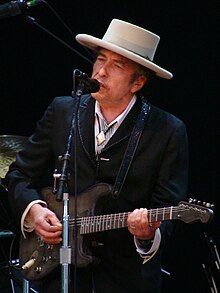 And speaking of protest songs, another musical genre was taking the stage (or different stages) with Folk, that later crossed to Folk Rock. Bob Dylan was the prime mover, following the footsteps of his inspiration, Woody Guthrie (my first summer job, in high school, was at the Greystone Park Psychiatric Hospital where Woody spent some of his last years, suffering from worsening Huntingdon's Disease, after being evicted by his New York landlord, a nasty sort named Trump). Dylan went to visit Guthrie at Greystone Park, en-route to his own great career as a protest singer in his own right (and eventual Nobel Prize winner). Blowin' in the Wind was perhaps his best known protest song, but The Times They Are A'Chagin' and A Hard Rain's Gonna Fall were all of that category, leading up to his mega-hit Like a Rolling Stone.
And speaking of protest songs, another musical genre was taking the stage (or different stages) with Folk, that later crossed to Folk Rock. Bob Dylan was the prime mover, following the footsteps of his inspiration, Woody Guthrie (my first summer job, in high school, was at the Greystone Park Psychiatric Hospital where Woody spent some of his last years, suffering from worsening Huntingdon's Disease, after being evicted by his New York landlord, a nasty sort named Trump). Dylan went to visit Guthrie at Greystone Park, en-route to his own great career as a protest singer in his own right (and eventual Nobel Prize winner). Blowin' in the Wind was perhaps his best known protest song, but The Times They Are A'Chagin' and A Hard Rain's Gonna Fall were all of that category, leading up to his mega-hit Like a Rolling Stone.
But I have to give Peter, Paul and Mary some space here as well. They did excellent covers of Pete Seeger's Where Have All the Flowers Gone? and Dylan's Blowin' in the Wind,' as well as their own works, such as Puff the Magic Dragon (my favorite) and Lemon Tree.
 Perhaps the greatest act of any kind to come from (as opposed to 'to') New York City was Simon and Garfunkle. Their smashing debut song Sounds of Silence was eerily predictive as well. And that produced a long list of great songs, from The Boxer to Bridge Over Troubled Water (also their greatest album, released following their breakup). And who can or will ever forget Mrs. Robinson, of The Graduate fame. (That movie was released when I was in college, and was again eerily prophetic).
Perhaps the greatest act of any kind to come from (as opposed to 'to') New York City was Simon and Garfunkle. Their smashing debut song Sounds of Silence was eerily predictive as well. And that produced a long list of great songs, from The Boxer to Bridge Over Troubled Water (also their greatest album, released following their breakup). And who can or will ever forget Mrs. Robinson, of The Graduate fame. (That movie was released when I was in college, and was again eerily prophetic).
Again introduced to me by my brother Ed, possibly the greatest folk artist of them all was Leonard Cohen (below), from Toronto. If you haven't ever heard his haunting Hallelujah, listen to it on Youtube (a tremendous resource). His Suzanne and So Long, Maryanne were also classics.
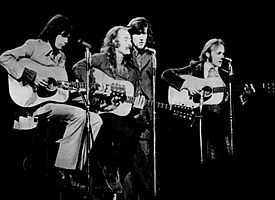
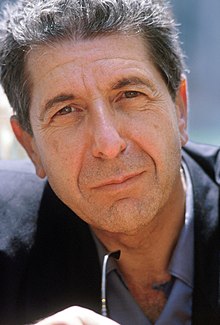 Other Folk and Folk Rock acts worthy of mention were lifelong protest singer Joan Baez, TV star Glen Campbell (Witchita Lineman and By the Time I get to Phoenix), Cat Stevens, Neil Young, then Crosby, Stills, Nash and Young, whose Teach Your Children and Our House are classics among others. Southern Cross might be my favorite.
Other Folk and Folk Rock acts worthy of mention were lifelong protest singer Joan Baez, TV star Glen Campbell (Witchita Lineman and By the Time I get to Phoenix), Cat Stevens, Neil Young, then Crosby, Stills, Nash and Young, whose Teach Your Children and Our House are classics among others. Southern Cross might be my favorite.
The Byrds, James Taylor, Joni Mitchell (Both Sides Now, Gordon Lightfoot (another Canadian), whose The Wreck of the Edmund Fitzgerald is a classic, albeit tragic. And Harry Chapin, whose Cats in the Cradle is a monumentally great folk song. Also Carly Simon, with her provocative You're So Vain and the James Bond title song from The Spy Who Loved Me, Nobody Does it Better (than 007, presumably) . And perhaps the most underrated singer/songwriter was Carole King, whose You've Got a Friend was covered by James Taylor and a huge hit. I love her Jazz Man, and It's Too Late as well. Also, for a great protest song, was Buffalo Springfield (from L.A.) with their provocative hit For What it's Worth. The band broke up bickering very quickly, but two members--Steve Stills and Neil Young would move on to form CSNY.
Woody Guthrie's son Arlo composed a protest song of his own, putting Stockbridge, Massachusetts on the musical map, with Alice's Restaurant. I also still listen to his rendition of Steve Goodman's great song of protest of another kind, with The City of New Orleans, another great protest song about the dying American railroad system.
And for Folk Rock, who doesn't love the UK's answer to Dylan, that Scotsman from County Cork named Donovan? The original Sunshine Superman. And come on, admit it. You, too, were Mellow Yellow once or twice. At least I was. Never could figure out that 'electric banana' thing though. Did he invent the vibrator? His greatest work, no doubt, was Catch the Wind, which even caught Dylan's attention. My favorite of his, though, was his eerily predictive hard rock Season of the Witch, which I cited in my first Tony Lowell Mystery novel, Hour of the Manatee page 2.
Ciao for Now,
E.C.

 My grandfather was a professor of music. My aunt was a concert pianist of international renown. My father loved classical music and having little choice other than to retreat upstairs to my room, I learned to listen and appreciate it. Which I think my father appreciated as well. But I think my real appreciation of classical and Baroque music occurred gradually, peaked by my acquisition of two close in center section box seats for The Florida Orchestra (an outstanding symphony orchestra). That's when I truly learned to appreciate such musical greats as Bach, particularly his Brandenburg Concertos, Beethoven's 7th Symphony with it's incredible (and incredibly moving) Adante, Piano Concerto, Vivaldi's Four Seasons, Dvorak's Symphony for the New World (the performance of in New York which he was able to attend and brought him a long standing ovation), pretty much anything by Chopin, and Mozart's Ein Klein Nacht Music.
My grandfather was a professor of music. My aunt was a concert pianist of international renown. My father loved classical music and having little choice other than to retreat upstairs to my room, I learned to listen and appreciate it. Which I think my father appreciated as well. But I think my real appreciation of classical and Baroque music occurred gradually, peaked by my acquisition of two close in center section box seats for The Florida Orchestra (an outstanding symphony orchestra). That's when I truly learned to appreciate such musical greats as Bach, particularly his Brandenburg Concertos, Beethoven's 7th Symphony with it's incredible (and incredibly moving) Adante, Piano Concerto, Vivaldi's Four Seasons, Dvorak's Symphony for the New World (the performance of in New York which he was able to attend and brought him a long standing ovation), pretty much anything by Chopin, and Mozart's Ein Klein Nacht Music. I cannot recall when I first heard jazz. I think it was my brother Ed (a huge five years older) who turned me on to it. I can remember that back in those days, there were jazz instrumentals on the charts, such as Al Hirt playing Java on trumpet. I was studying trumpet at the time, and leaned to play it well enough that our band and orchestra instructor took me on a tour to other schools in the area, backed by the orchestra. But I gave up trumpet in college, and never played it again. I can't help wondering if having heard Miles Davis (pictured on the right) early on (he peaked around 1959 with his seminal album Kind of Blue) might have made a difference.
I cannot recall when I first heard jazz. I think it was my brother Ed (a huge five years older) who turned me on to it. I can remember that back in those days, there were jazz instrumentals on the charts, such as Al Hirt playing Java on trumpet. I was studying trumpet at the time, and leaned to play it well enough that our band and orchestra instructor took me on a tour to other schools in the area, backed by the orchestra. But I gave up trumpet in college, and never played it again. I can't help wondering if having heard Miles Davis (pictured on the right) early on (he peaked around 1959 with his seminal album Kind of Blue) might have made a difference. Of course it was inevitable that I'd hear the great Louis Armstrong (the Satchmo, and the first famous person I'd heard of who smoked weed prior to every performance, according to his own memoirs). And his partner in crime, the great Ella Fitzergald was not to be missed.
Of course it was inevitable that I'd hear the great Louis Armstrong (the Satchmo, and the first famous person I'd heard of who smoked weed prior to every performance, according to his own memoirs). And his partner in crime, the great Ella Fitzergald was not to be missed.Another '50's jazz single I liked was Canadian Moe Koffman playing flute on his hit Swingin' Shepherd Blues.
 And I don't think I'm alone in considering Ramsey Lewis (left) and his The In Crowd an all time favorite. Who doesn't want to be in the In Crowd?
And I don't think I'm alone in considering Ramsey Lewis (left) and his The In Crowd an all time favorite. Who doesn't want to be in the In Crowd?I have fond memories of first listening to Vince Guaraldi and his jazz piano solo Cast Your Fate to the Wind. It evoked beauty, and sadness both. Vince would later on write the music for the comic animations of Peanuts.
 The first jazz saxophonist to catch my ear during my years in L.A. was Grover Washington, Jr., (right) with his Winelight album, which I still have in cassette format (and yes, I still have a cassette player, that also plays CDs, so there!).
The first jazz saxophonist to catch my ear during my years in L.A. was Grover Washington, Jr., (right) with his Winelight album, which I still have in cassette format (and yes, I still have a cassette player, that also plays CDs, so there!).Another favorite jazz performance was Brazilian saxophonist Gato Barbieri (Gato means cat, and he was a cool one) playing Europa. And guess who the composer of that tune was? Carlos Santana.
 My favorite cut by John Coltrane (left) was Equinox.Man could he make that sax sing.
My favorite cut by John Coltrane (left) was Equinox.Man could he make that sax sing.My favorite Miles Davis track was his rendition of It Ain't Necessarily So, on his Porgy and Bess album, in 1959.
 Yet another favorite saxophonist is Stan Getz (right). I still have two great albums of his, but my favorite (and possibly yours) is the album he recorded in Rio de Janiero, Getz and Gilberto with vocalist Joao Gilberto, who made the mistake of bringing his wife, Astrud. Her vocals on The Girl from Ipanema made me want to jump on the next plane to Rio. Somehow I never did. Sad. (An actual sad outcome of this album, at least for Joao, was Getz stealing his wife. Seriously, Stan).
Yet another favorite saxophonist is Stan Getz (right). I still have two great albums of his, but my favorite (and possibly yours) is the album he recorded in Rio de Janiero, Getz and Gilberto with vocalist Joao Gilberto, who made the mistake of bringing his wife, Astrud. Her vocals on The Girl from Ipanema made me want to jump on the next plane to Rio. Somehow I never did. Sad. (An actual sad outcome of this album, at least for Joao, was Getz stealing his wife. Seriously, Stan). A more recent favorite on trumpet is Rick Braun (Cadillac Slim).
A more recent favorite on trumpet is Rick Braun (Cadillac Slim).And not to be outdone on sax, Cannonball Adderly's live performance of Mercy, Mercy, Mercy is a classic. I just wish I could reach back in time and strangle the guy in the audience for yelling 'Woo hoo' about a million times. (Pictured here with his cornet-playing brother Nat.
 A less well-known jazz artist is Jean Luc Ponty, out of Paris. He made the international charts on the violin, of all instruments with his original: Renaissance. I first heard that on an FM station in my 20's, while stuck in traffic in Washington D.C., for some reason.
A less well-known jazz artist is Jean Luc Ponty, out of Paris. He made the international charts on the violin, of all instruments with his original: Renaissance. I first heard that on an FM station in my 20's, while stuck in traffic in Washington D.C., for some reason. Then, how about Peggy Lee's great hit, Fever. Just her and an upright bass.
Then, how about Peggy Lee's great hit, Fever. Just her and an upright bass. Other female singers I like a lot are Brenda Russell (Piano in the Dark), and Randy Crawford (Rio de Janiero Blue and Cajun Moon). And especially Sade (pronounced 'Shar-day'). Go to Youtube and summon up her performance video of her dissing off Mr. Smooth Operator.
Other female singers I like a lot are Brenda Russell (Piano in the Dark), and Randy Crawford (Rio de Janiero Blue and Cajun Moon). And especially Sade (pronounced 'Shar-day'). Go to Youtube and summon up her performance video of her dissing off Mr. Smooth Operator.A Southerner to the bone was singer, songwriter and pianist Mose Allison, who combined jazz with blues, and whose classic Parchman Farm (the name of a Mississippi prison, so you can imagine how bad it was there) was covered by John Mayall, among others. Allison's music had an important influence on other artists, such as Jimi Hendrix, J. J. Cale, the Yardbirds, the Rolling Stones, Tom Waits, and Pete Townshend.

 Thanks to my brother Ed I discovered the big bands when I was still in middle school (we called it Junior High in New Jersey, where we lived). He introduced me to the Count Basie Orchestra, Glenn Miller (right) who had more number one hits than the Beatles or Elvis before vanishing in a fighter plane over the English Channel during WW II, and the great Duke Ellington, (left) for the big band sound. For specific favorites, Miller's In the Mood qualifies. Also Ray Anthony's rendition of the great classic Harlem Nocturne. Ellington's band theme song was 'Take the A Train.' Something I did numerous times during my New York years.
Thanks to my brother Ed I discovered the big bands when I was still in middle school (we called it Junior High in New Jersey, where we lived). He introduced me to the Count Basie Orchestra, Glenn Miller (right) who had more number one hits than the Beatles or Elvis before vanishing in a fighter plane over the English Channel during WW II, and the great Duke Ellington, (left) for the big band sound. For specific favorites, Miller's In the Mood qualifies. Also Ray Anthony's rendition of the great classic Harlem Nocturne. Ellington's band theme song was 'Take the A Train.' Something I did numerous times during my New York years.When I was in high school I discovered Buddy Morrow, another big band from the '40s. and played my '45 of Night Train over and over, until I wore it out.
 And who doesn't love John Barry's James Bond theme. That twangy guitar was played by Vic Flick (great name!). He was paid nine pounds for his studio work (hey, just a few takes at most, right?). And hey, adjusted to inflation that's probably close to 100 bucks, OK?). John Barry did eventually do the right thing, and cut Flick in on the millions in royalties he'd been getting for a dozen or two Bond films.
And who doesn't love John Barry's James Bond theme. That twangy guitar was played by Vic Flick (great name!). He was paid nine pounds for his studio work (hey, just a few takes at most, right?). And hey, adjusted to inflation that's probably close to 100 bucks, OK?). John Barry did eventually do the right thing, and cut Flick in on the millions in royalties he'd been getting for a dozen or two Bond films.But small bands were coming, some just four players, such as Ramsey Lewis, and The Dave Brubeck Quartet, whose Take Five from his Time Out album (the tune was composed by his alto saxophonist Paul Desmond).Then came artists who were virtuosos in ensembles of any size, such as Miles Davis, John Coltrane, and Cannonball Adderly, all of whom reached greatness. For anyone who has not listened to these artists, or not recently, now would be an excellent time. For specific faves, Dave Brubeck's monumental hit from the album Time Out was Take Five (albeit composed by his alto saxophonist Paul Desmond) is way up there;
 One of the very first bands to cross over to jazz from Gospel and Memphis (also a trend-setting integrated combo) , if not the first jazz combo (also a quartet) was Booker T. and the M.G.'s (left) with their mega-hit Green Onions. They were also one of the first integrated bands, apart from the classic big bands.
One of the very first bands to cross over to jazz from Gospel and Memphis (also a trend-setting integrated combo) , if not the first jazz combo (also a quartet) was Booker T. and the M.G.'s (left) with their mega-hit Green Onions. They were also one of the first integrated bands, apart from the classic big bands.With the Sixties, of course, Rock and Roll came of age, graduating from Buddy Holly, the Everly Brothers and Elvis, to the British Invasion, and Rock exploded across the world, coming from as far away as Australia (The Bee Gees and AC/DC), spreading in the '70's even to/from France, with Enigma, as well as ABBA from Sweden.
 But, as loud as Mick Jagger might shout his denials, it was The Beatles who changed the world. Sgt. Pepper's Lonely Hearts Club Band was a truly revolutionary work, and much of the credit for their success was their producer/arranger the great George Martin.
But, as loud as Mick Jagger might shout his denials, it was The Beatles who changed the world. Sgt. Pepper's Lonely Hearts Club Band was a truly revolutionary work, and much of the credit for their success was their producer/arranger the great George Martin.
 Meanwhile, back in the States California Dreamin' was soon in vogue, led by The Beach Boys first, then some cool surfing instrumentals like The Chantays' Pipeline and Walk Don't Run by The Ventures (From Tacoma, Washington, no less. Tthere was a host of those, back then, such as Dick Dale's Miserlou, then heading south for a shot of Tequila by The Champs (or maybe just East L.A.) then back east to Memphis for, well, Memphis by Lonnie Mack. (Actually, it was Johnny Rivers' song first, he wrote it, and it's a great, but sad song: here's the original).
Meanwhile, back in the States California Dreamin' was soon in vogue, led by The Beach Boys first, then some cool surfing instrumentals like The Chantays' Pipeline and Walk Don't Run by The Ventures (From Tacoma, Washington, no less. Tthere was a host of those, back then, such as Dick Dale's Miserlou, then heading south for a shot of Tequila by The Champs (or maybe just East L.A.) then back east to Memphis for, well, Memphis by Lonnie Mack. (Actually, it was Johnny Rivers' song first, he wrote it, and it's a great, but sad song: here's the original).Ahead of their time were The Zombies, who were actually skilled musicians. Their hit She's Not There blew me away with that keyboard solo by (most rock musicians were not, until the great guitar players like Jimmy Page (Led Zeppelin) Mike Bloomfield, Elvin Bishop, Brian May, Eric Clapton, Pink Floyd's David Gilmour, Peter Townsend, and Peter Green (more on some of these later).

 Then there was that incredible one-time Monterrey Pop Festival in 1967, led by the Jefferson Airplane, with Grace Slick, and introducing The Jimi Hendrix Experience to the world, The Who to the States, likewise Eric Burden and The Animals, and of course S.F.'s Grateful Dead would leave thousands of fans grateful, if not dead (quite). The band is known for its eclectic style, which fused rock, jazz, country, blues gospel, and psychedelic. elements of rock, folk, country, jazz, bluegrass, blues, gospel, and psychedelic rock;[3][4] for live performances of lengthy instrumental jams;[5][6] and for its devoted fan base, known as "Deadheads." "Their music," writes Lenny Kaye, "touches on ground that most other groups don't even know exists. Also Otis Redding's first major appearance, and almost his last. He tragically died in a plane crash (like so many other music stars) before Sittin' on the Dock of the Bay was even released. Also appearing in her first major appearance, Janis Joplin's Big Brother and the Holding Company. And Ravi Shankar was there with his sitar to lure Westerners to his ashram (the Beatles would later take him up on it). The festival closed with The Mamas and the Papas (band founder John Phillips was co-organizer of the Festival) with their smash breakout hit California Dreamin'. It was The Summer of Love, much, in effect, to counter the war in Vietnam.
Then there was that incredible one-time Monterrey Pop Festival in 1967, led by the Jefferson Airplane, with Grace Slick, and introducing The Jimi Hendrix Experience to the world, The Who to the States, likewise Eric Burden and The Animals, and of course S.F.'s Grateful Dead would leave thousands of fans grateful, if not dead (quite). The band is known for its eclectic style, which fused rock, jazz, country, blues gospel, and psychedelic. elements of rock, folk, country, jazz, bluegrass, blues, gospel, and psychedelic rock;[3][4] for live performances of lengthy instrumental jams;[5][6] and for its devoted fan base, known as "Deadheads." "Their music," writes Lenny Kaye, "touches on ground that most other groups don't even know exists. Also Otis Redding's first major appearance, and almost his last. He tragically died in a plane crash (like so many other music stars) before Sittin' on the Dock of the Bay was even released. Also appearing in her first major appearance, Janis Joplin's Big Brother and the Holding Company. And Ravi Shankar was there with his sitar to lure Westerners to his ashram (the Beatles would later take him up on it). The festival closed with The Mamas and the Papas (band founder John Phillips was co-organizer of the Festival) with their smash breakout hit California Dreamin'. It was The Summer of Love, much, in effect, to counter the war in Vietnam. Then things would take a darker turn, perhaps due to Vietnam, with The Doors, predicting The End; then pointed protest songs like Country Joe and the Fish with their Fixin' to Die, and Barry McGuire's Eve of Destruction (are we facing another such eve now?).
Then things would take a darker turn, perhaps due to Vietnam, with The Doors, predicting The End; then pointed protest songs like Country Joe and the Fish with their Fixin' to Die, and Barry McGuire's Eve of Destruction (are we facing another such eve now?).Another fine rock band emerged out of New York (complete with Brooklyn accent: 'I hoid it through the grapevine') in Creedence Clearwater Revival, led by John Fogarty. Their hit Fortunate Son was also a protest song.
Other great rock bands that deserve mention are The Animals, led by Eric Burden, with their breakout hit House of the Rising Sun. Also
The Police, and even better, Sting when he went solo, Cream, Pink Floyd, Led Zeppelin, and more recently The Verve, again from the UK.
 Outstanding solo artists must include Van Morrison, who started out in Belfast with his band Them (Gloria), then went on to a brilliant solo career. His Into the Mystic was mystical in numerous ways, and his 1970 album Moondance is in my top ten greatest. Give it a listen if you haven't.
Outstanding solo artists must include Van Morrison, who started out in Belfast with his band Them (Gloria), then went on to a brilliant solo career. His Into the Mystic was mystical in numerous ways, and his 1970 album Moondance is in my top ten greatest. Give it a listen if you haven't.
 I must also include blues on this list. I first encountered blues when I attended the Newport Folk Festival (where Dylan made his name), and heard this incredible heavy electric sound. I wanted over to see and hear what was what, and it was an all-black band led by a huge man named Howlin' Wolf, and man could he howl. Electric guitars way ahead of their time, and a man named Willy Dixon on base. I later learned bass from him, and joined the only blues band in NYC at the time as bassist. It was kind of sad when I looked him up in L.A. years later, and he was living in a run-down motel.
I must also include blues on this list. I first encountered blues when I attended the Newport Folk Festival (where Dylan made his name), and heard this incredible heavy electric sound. I wanted over to see and hear what was what, and it was an all-black band led by a huge man named Howlin' Wolf, and man could he howl. Electric guitars way ahead of their time, and a man named Willy Dixon on base. I later learned bass from him, and joined the only blues band in NYC at the time as bassist. It was kind of sad when I looked him up in L.A. years later, and he was living in a run-down motel.Eric Clapton was, of course, the premier blues guitarist of his generation, although Peter Green, who started out with John Mayall and the Bluesbreakers.was way up there (check out an incredible solo tune of his, performed with Mayall's band, called The Supernatural. It definitely sounds supernatural. Greene would move on to co-found Fleetwood Mac, and the Rock and Roll Hall of Fame from there.
Also, Pink Floyd's David Gilmour was an incredible guitarist. Who can forget his long solo on Shine On You Crazy Diamond. It would make you wish you were there, indeed.
Eric Clapton started out with The Yardbirds (which had three of rock's most famous guitarists, Eric Clapton, Jimmy Page and Jeff Beck, all of whom ranked in the top five of Rolling Stone magazine's list of 100 greatest guitarists. Clapton then joined John Mayall, then Cream, then went solo, earning no less than 19 Grammy Awards.
I think I would have to say that the Rock Era came to an end with Don McLean with his classic American Pie.
 And speaking of protest songs, another musical genre was taking the stage (or different stages) with Folk, that later crossed to Folk Rock. Bob Dylan was the prime mover, following the footsteps of his inspiration, Woody Guthrie (my first summer job, in high school, was at the Greystone Park Psychiatric Hospital where Woody spent some of his last years, suffering from worsening Huntingdon's Disease, after being evicted by his New York landlord, a nasty sort named Trump). Dylan went to visit Guthrie at Greystone Park, en-route to his own great career as a protest singer in his own right (and eventual Nobel Prize winner). Blowin' in the Wind was perhaps his best known protest song, but The Times They Are A'Chagin' and A Hard Rain's Gonna Fall were all of that category, leading up to his mega-hit Like a Rolling Stone.
And speaking of protest songs, another musical genre was taking the stage (or different stages) with Folk, that later crossed to Folk Rock. Bob Dylan was the prime mover, following the footsteps of his inspiration, Woody Guthrie (my first summer job, in high school, was at the Greystone Park Psychiatric Hospital where Woody spent some of his last years, suffering from worsening Huntingdon's Disease, after being evicted by his New York landlord, a nasty sort named Trump). Dylan went to visit Guthrie at Greystone Park, en-route to his own great career as a protest singer in his own right (and eventual Nobel Prize winner). Blowin' in the Wind was perhaps his best known protest song, but The Times They Are A'Chagin' and A Hard Rain's Gonna Fall were all of that category, leading up to his mega-hit Like a Rolling Stone.But I have to give Peter, Paul and Mary some space here as well. They did excellent covers of Pete Seeger's Where Have All the Flowers Gone? and Dylan's Blowin' in the Wind,' as well as their own works, such as Puff the Magic Dragon (my favorite) and Lemon Tree.
 Perhaps the greatest act of any kind to come from (as opposed to 'to') New York City was Simon and Garfunkle. Their smashing debut song Sounds of Silence was eerily predictive as well. And that produced a long list of great songs, from The Boxer to Bridge Over Troubled Water (also their greatest album, released following their breakup). And who can or will ever forget Mrs. Robinson, of The Graduate fame. (That movie was released when I was in college, and was again eerily prophetic).
Perhaps the greatest act of any kind to come from (as opposed to 'to') New York City was Simon and Garfunkle. Their smashing debut song Sounds of Silence was eerily predictive as well. And that produced a long list of great songs, from The Boxer to Bridge Over Troubled Water (also their greatest album, released following their breakup). And who can or will ever forget Mrs. Robinson, of The Graduate fame. (That movie was released when I was in college, and was again eerily prophetic).Again introduced to me by my brother Ed, possibly the greatest folk artist of them all was Leonard Cohen (below), from Toronto. If you haven't ever heard his haunting Hallelujah, listen to it on Youtube (a tremendous resource). His Suzanne and So Long, Maryanne were also classics.

 Other Folk and Folk Rock acts worthy of mention were lifelong protest singer Joan Baez, TV star Glen Campbell (Witchita Lineman and By the Time I get to Phoenix), Cat Stevens, Neil Young, then Crosby, Stills, Nash and Young, whose Teach Your Children and Our House are classics among others. Southern Cross might be my favorite.
Other Folk and Folk Rock acts worthy of mention were lifelong protest singer Joan Baez, TV star Glen Campbell (Witchita Lineman and By the Time I get to Phoenix), Cat Stevens, Neil Young, then Crosby, Stills, Nash and Young, whose Teach Your Children and Our House are classics among others. Southern Cross might be my favorite.The Byrds, James Taylor, Joni Mitchell (Both Sides Now, Gordon Lightfoot (another Canadian), whose The Wreck of the Edmund Fitzgerald is a classic, albeit tragic. And Harry Chapin, whose Cats in the Cradle is a monumentally great folk song. Also Carly Simon, with her provocative You're So Vain and the James Bond title song from The Spy Who Loved Me, Nobody Does it Better (than 007, presumably) . And perhaps the most underrated singer/songwriter was Carole King, whose You've Got a Friend was covered by James Taylor and a huge hit. I love her Jazz Man, and It's Too Late as well. Also, for a great protest song, was Buffalo Springfield (from L.A.) with their provocative hit For What it's Worth. The band broke up bickering very quickly, but two members--Steve Stills and Neil Young would move on to form CSNY.
Woody Guthrie's son Arlo composed a protest song of his own, putting Stockbridge, Massachusetts on the musical map, with Alice's Restaurant. I also still listen to his rendition of Steve Goodman's great song of protest of another kind, with The City of New Orleans, another great protest song about the dying American railroad system.
And for Folk Rock, who doesn't love the UK's answer to Dylan, that Scotsman from County Cork named Donovan? The original Sunshine Superman. And come on, admit it. You, too, were Mellow Yellow once or twice. At least I was. Never could figure out that 'electric banana' thing though. Did he invent the vibrator? His greatest work, no doubt, was Catch the Wind, which even caught Dylan's attention. My favorite of his, though, was his eerily predictive hard rock Season of the Witch, which I cited in my first Tony Lowell Mystery novel, Hour of the Manatee page 2.
Ciao for Now,
E.C.



Comments
Post a Comment